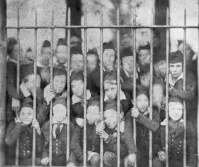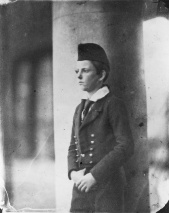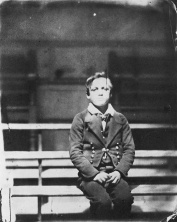Trondheim
‘An X-ray picture of the subcutaneous breaks and sprains in a rocky relationship. When their son collapses, an unhappy couple travels to his bedside, leaving behind none of their exquisitely described marital baggage … Irish writer James’ delicate, incisive novel […] captures with forensic accuracy the subtle tensions in the marriage. … [Their son’s] medical situation is acute and dramatic, but the women’s marital troubles, mundane and chronic, are the real subject of this extraordinary and meticulous little book.’ — Kirkus (starred review) More…
publication date: 6 February 2024
_______________
The Surfacing
 ‘James uses the sublime appeal of the Arctic and the extreme situation of his characters as the stage for an essentially domestic psychological novel. The Surfacing is about how people live together and how we rise to the occasion of pregnancy and birth… This is a book for grownups, one that finds its best hope not in romance or friendship or the drama of seeking and finding, because none of those things happen, but in the capacity of human beings to endure… It is an austere pleasure to read.’ — The Guardian More…
‘James uses the sublime appeal of the Arctic and the extreme situation of his characters as the stage for an essentially domestic psychological novel. The Surfacing is about how people live together and how we rise to the occasion of pregnancy and birth… This is a book for grownups, one that finds its best hope not in romance or friendship or the drama of seeking and finding, because none of those things happen, but in the capacity of human beings to endure… It is an austere pleasure to read.’ — The Guardian More…
 ‘Gratifyingly defies expectations.’ — New York Times Book Review
‘Gratifyingly defies expectations.’ — New York Times Book Review
‘[A] harrowing Arctic adventure.’ – Oprah.com Book Club selection
‘James’ hypnotic North American debut [is] less a high-stakes adventure than a slow-burning psychological study… Meditative and spare, this is not a fast read but one worth the effort: underneath all the ice, there is real emotional depth.” — Kirkus
‘In a genre whose characteristics can too easily veer towards cliché, the writing sparkles with inventiveness… The Surfacing is so compelling that the 14-year wait can be forgiven. Though when a writer can produce something this powerful, I hope it’s not too demanding to say it would be nice not to have to wait so long next time.’ — Irish Times More…
.. ‘Although it initially appears to focus on the unwinnable crusade of man against nature, at its centre is a love story – not a romance between adults but between a father and the son he learns to love… James’s depictions of the Arctic are beautifully brutal, and his alignment of maternity with the enthralling yet treacherous landscape emphasises Morgan’s fear of both… The Surfacing is a moving reminder that some of the biggest journeys in life don’t involve going anywhere at all.’ — Financial Times More…
‘Although it initially appears to focus on the unwinnable crusade of man against nature, at its centre is a love story – not a romance between adults but between a father and the son he learns to love… James’s depictions of the Arctic are beautifully brutal, and his alignment of maternity with the enthralling yet treacherous landscape emphasises Morgan’s fear of both… The Surfacing is a moving reminder that some of the biggest journeys in life don’t involve going anywhere at all.’ — Financial Times More…
‘James’s haunting novel memorably captures the desolate landscape and the triumph of the human spirit in adversity.‘ — Mail on Sunday
 ‘The cool precision of James’s writing draws you on as surely as if you’re there, trapped in that claustrophobic interior with the vast northern landscape stretching forever outside. Plenty of bitchy, scrappy dialogue adds a blackly comic note, but James’s overarching storyline is measured, stately, assured… A great start to the new reading season.’ — Arminta Wallace, Irish Times More…
‘The cool precision of James’s writing draws you on as surely as if you’re there, trapped in that claustrophobic interior with the vast northern landscape stretching forever outside. Plenty of bitchy, scrappy dialogue adds a blackly comic note, but James’s overarching storyline is measured, stately, assured… A great start to the new reading season.’ — Arminta Wallace, Irish Times More…
‘James’s story is told in lean, cool, poetic prose and is utterly compelling.’ — Sunday Herald (Scotland)
‘An epic tale of a quite magnificent futility.’ — Declan Burke, Irish Examiner More…
‘The Surfacing’s depiction of the harsh, sub-zero realities facing those brave souls who chose to join the Franklin search party makes for an engrossing read. However, it is James’ willingness to break free from the limitations of the traditional Arctic tale that takes the novel beyond the genre and widens its appeal. It allows the novel to venture far beyond the expedition narrative and delve into issues of fatherhood and responsibility, bringing all the complexities of the crew’s life back home under the blinding glare and unforgiving scrutiny of the Arctic sun.’ — Irish Independent More…
‘A nuanced meditation on fatherhood and, along the way, there are some terrific portrayals of life aboard ship in the mid-19th century. . . . The joy is in the prose, lyrical but not overblown, and the winningly straightforward plot. There’s also every chance that you’ll be tempted to turn up the thermostat while reading.’ — Geographical Magazine.
‘A rare blend of adventure narrative and literary fiction, survival story and philosophical musing. . . . What emerges is a pure and transcendent vision of the joy of fatherhood—and the joy of learning to trust another person in the face of a future that may hold nothing but ice and darkness.’ — Historical Novels Review. More
advance appreciation:
‘The great topic of Cormac James’s The Surfacing is the reach of human possibility. The prose is calm, vivid, hypnotic and acutely piercing. James is attuned to the psychological moment: this is a book about fatherhood and all its attendant terrors. It’s a remarkable achievement…. James recognises the surfacing of love in the face of solitude. A stylish novel, full of music and quiet control. This is a writer that I’d like to see hurry – I’m looking forward already to the next book.’ — Colum McCann
‘The Surfacing is an extraordinary novel, combining a powerful narrative with a considered and poetic use of language in a way that is not often seen these days. Reading the book, I recalled the dramatic natural landscape of Jack London and the wild untamed seas of William Golding. Cormac James’s writing is ambitious enough to be compared with either.’ — John Boyne
‘Cormac James’s writing is very assured, with a harsh poetic edge. His evocations of barren landscape, sea weather, pack ice and frozen skies are powerful and compelling.’ — Rose Tremain
‘I read The Surfacing in Gjoa Haven, where Franklin Expedition spirits seem to cry out on the winter winds, and Cormac James’ writing spoke through the midday twilight with the chill of a voice from the distant past. Like the High Arctic world that he masterfully conjures, his storytelling is beautifully stark and captivating. The Surfacing lures with the tundra’s promise: new life can come from death.’ — Paul Watson, Arctic correspondent for the Toronto Star, and author of Where War Lives
________________________
Track and Field
“There’s something Homeric in Track and Field, or perhaps it’s the influence of Celtic myths. The three men bringing their dead kinsman home, the ineffably long and difficult journey, the series of confrontations with monsters in a lawless world, then this coincidence of chaotic darkness and dishonourable, sullying violence. When the bright morning comes, the brothers … find their regeneration … and the disgrace of the previous day is washed away. They are nearly home among their own people. The mythic elation of these last scenes is pure joy to read.”
— Robert Farren. The Sunday Independent
“In a bedroom three brothers shoulder a homemade box coffin in which lies their dead fourth brother. They roughhandle it downstairs, put it in the back of a truck and head south to effect a proper burial. Their 36-hour journey – not least those first actual movements – is the stuff of this astonishing debut novel by a 29-year-old Cork writer. Cormac James has set his story during the Irish Civil War, yet realism has little part to play in this novel. The brothers speak anachronistically (but brilliantly), the roadblocks encountered are surely the roadblocks on the highway to Hades, not to Horse-and-Jockey, the details reported by the narrator are disturbingly singular. Yet it all hangs together with a menacing dramatic charge, due largely to the filmic character of the novel. If this extraordinary, left-of-field story resembles any other thing, it is like Clouzet’s black and brilliant film, The Wages of Fear. Marvellous.”
— Mary Kenny. RTE Guide
You must be logged in to post a comment.